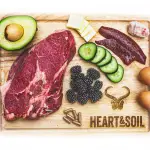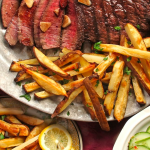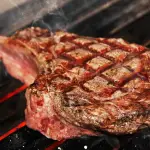Intermittent fasting has become one of most popular ways to lose weight and obtain optimal health. It helps in weight loss and regularises your hormones, fastens your metabolism, slows aging, and helps you live longer.
As a general rule, intermittent fasting is not aligned with any specific diet, but it’s better to stick to healthy unprocessed foods for the best results.
Intermittent fasting on the carnivore diet has some pros and cons. Here we’ll look at both to see if this eating plan is right for you.
TABLE OF CONTENTS
What is Intermittent Fasting?

Intermittent fasting is a technique where you focus on “when” to eat rather than “what” to eat. It is a dietary pattern where you fast for 14 to 16 hours and eat in a window of 10 to 8 hours. The idea is to burn all the calories and stored glycogen in the body, so your body survives on fat and burns it efficiently. The more fat you burn, the leaner you become.
Don’t get overwhelmed if the idea of fasting is new to you. Our bodies are designed to survive for more extended periods without food. Millions of people observe fasting; some do it for religion, some for health, and some for both.
To do intermittent fasting correctly, simply skip breakfast or dinner and only eat two meals a day. Or eat one meal a day (OMAD). This creates a long fasting window between meals, but allows you to get all your nutrients and calories in a day.
Pros of Intermittent Fasting on a Carnivore Diet
Here are the reasons why you should include intermittent fasting on the carnivore diet:
Fat Loss
Intermittent fasting typically helps you eat fewer calories, which creates a constant caloric deficit, so your body starts cutting fat. During the fasting period, insulin levels decrease, and it’s easier to mobilize fat because insulin is a fat-storage hormone.
Intermittent fasting increases your metabolism and basal metabolic rate (BMR). This means you burn more calories at rest, and your body processes food faster. Fewer calories in and more calories out creates a negative caloric balance, and your body loses weight.
Maintaining Muscle
Intermittent fasting is great for maintaining muscle mass.
Adding high protein foods to each meal is critical when intermittent fasting, which is easy because the carnivore diet is rich in protein.
The carnivore diet along with the calorie deficit created by intermittent fasting helps with body recomposition, where you cut fat and get muscle at the same time. Intermittent fasting is also said to increase growth hormone, thus helping in muscle building.
Better Metabolic Health
Insulin resistance is the cause of many so-called metabolic diseases. Metabolic diseases are not actually diseases — they are lifestyle disorders and can be rectified by changing your daily life.
Insulin resistance is when your body stops responding to insulin. Insulin directs sugar from the blood into the cells. Without insulin, blood sugar raises, and cells are deprived of sugar. This is the basis of many diseases, including Diabetes type 2, ischemic heart diseases, Polycystic ovarian syndrome, PCOS, hypertension, fatty liver disease, and Alzheimer’s disease.
Eating a carnivore pattern along with intermittent fasting regulates insulin and rectifies your metabolic health.
Cons of Intermittent Fasting on the Carnivore Diet
Here are the reasons that intermittent fasting may not be right for you at this time on the carnivore diet:
Hunger
Protein and fat make you feel full, but fasting for long periods can make you feel incredibly hungry, especially if you are new to carnivore eating.
Our advice is to start slow. Don’t go for a 16-hour fast at first. Start with a 10 or 12 hours fast, which includes your sleeping time. You can gradually increase the fasting window.
If you’ve just started the carnivore diet, wait at least a few weeks before you start fasting, so your body can adapt to this new way of eating.
Fatigue & Lethargy
Calories lower than your BMR can cause fatigue and lethargy. When you start the carnivore diet and give up calorically-dense processed foods, it can be easy to accidentally reduce your calories too much, which wrecks your metabolism.
You can still do intermittent fasting, but make sure the other meals you’re eating add up to no less than 1200 calories.
Constipation
Constipation on the carnivore diet is a common side effect that is often exacerbated when fasting.
People usually think it’s because of a lack of fiber, but it’s actually because of dehydration. Don’t forget to drink water throughout your day, even during fasting windows.
Try adding salt to your water to get a boost of electrolytes, but not consume any protein, fat, or carbs. The best carnivore diet salt is himalayan sea salt.
The Bottom Line
The carnivore diet, along with intermittent fasting, is a great combination to bring your health back on track. It mimics the eating patterns of our ancestors, and has numerous benefits.
However, you must take care of a few things, especially if you are a beginner — like getting adequate electrolytes, and making sure you’re eating enough calories at your other meals, including adequate protein.
Weigh the pros and cons of intermittent fasting and see how your body responds as you try it.









I have been on the carnivore diet for 1 month now and doing intermittent fasting of 16:8. I have been losing weight regularly. But when I weighed one morning I had gained 6 pounds over night. I also haven’t had a BM for a while. Is this common?
Hi Cecile, don’t worry — that’s very common. The weight is likely just water retention, not fat. A high sodium meal the day before (or just not drinking as much water) could have caused it. Alternatively, many people suffer from diarrhea for the first month after they start the carnivore diet, so it’s possible that your body has only just adjusted, and will now pass food normally. It’s typical to have fewer and smaller bowel movements on the carnivore diet because the body is actually using and absorbing what you consume, and there is no dietary fiber. If you’re worried or feel discomfort, it’s always worth seeking the advice of a doctor, just in case. Hope that helps!